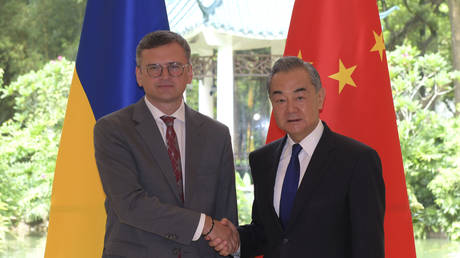
Ukrainian Foreign Minister Dmitry Kuleba’s trip to Guangzhou, where he hinted at readiness for talks, may have meant more than he realizes
Ukrainian Foreign Minister Dmitry Kuleba went on a three-day visit to China last week. The most important part of this trip was Kuleba’s meeting with China’s foreign minister, Wang Yi, which took place not in Beijing but Guangzhou, a business and industry megalopolis. That choice of location may carry an ambiguous message (more on which below). However, there is no ambiguity about the fact that Kuleba going to China is one of those fairly frequent events in international politics where it is easy to intuit that something important is afoot but hard to figure out what exactly. Official statements tell only part of the story, and it is clear that they do not reveal the most sensitive and potentially impactful aspects of the encounter.
So, what was it all about? Let’s start with the timing: Why now? Kuleba, whose interactions with Ukraine’s Western backers seem to have fostered his habitually ungracious style, ended his visit with a guess that was both nonsensical and tactless. In a long interview with the Ukrainian TSN TV channel, he surmised that China had “matured” to the point of “such a conversation.” A diplomat actually practicing diplomacy might have said that the situation had “matured.” To make that statement about China carried more than a whiff of self-defeating smugness.
In reality, the most obvious explanation of the timing of Kuleba’s trip is also the most plausible one: Ukraine’s reaching out to China at this point is a result of its difficult, even dire military and political situation: Russia has held the initiative on the battlefield for at least half a year and is making steady progress in diminishing already badly depleted Ukrainian forces by attrition. By now, even staunchly pro-Ukrainian British newspaper The Telegraph admits that Russia is making large advances, while Kiev’s desperate mobilization drive has run into widespread resistance, and an unprecedentedly large share of Ukrainians (44% and growing) do not shy away from telling pollsters that they want peace negotiations to start.
At the same time, vital Western support for Ukraine remains extremely fragile; even with the poll bump that the US Democrats have reaped from replacing the clearly senescent current President Joe Biden as their election candidate with his vice president, Kamala Harris, a Donald Trump victory in November is still the likeliest outcome of the election. And with that a policy of abrupt withdrawal of American support unless Kiev makes peace on de facto Russian terms.
In that case, even if the EU members of NATO should be deluded enough to try to pick up the slack, they would not be able to compensate for the gaping hole that a US withdrawal from the proxy war would leave behind. Finally, even if the US Democrats should prevail against the odds in the November election, there is no certainty that Harris would simply continue Biden’s proxy war policy in Ukraine. In sum, whichever way you slice it, Kiev must prepare for a likely loss or severe reduction of Western support that even as it is now has not been sufficient to turn the tide of war in its favor.
No wonder, then, that Ukrainian leader Vladimir Zelensky, his government, and its media proxies have started – if ever so late and inconsistently – to signal a growing readiness to negotiate with Moscow: in an interview with US newspaper the Philadelphia Inquirer, in an address at home in Ukraine, in talks at the Vatican, and, in general, in the Ukrainian public sphere. There, as Ukrainian publication Strana.ua has pointed out, ending the war without recovering the borders of 1991 (still Kiev’s official war aim), that is, by making territorial concessions to Russia, “is being discussed actively.”
And, of course, after the predictable failure of the silly Burgenstock scheme – holding a “peace summit” without one of the warring parties, moreover, the one that is winning – Ukraine has also publicly acknowledged the need for another conference, this time including Moscow. Now, Kuleba has used his trip to China to signal a new readiness to talk directly to Russia.
All of the above is the real backdrop to the meeting between Kuleba and Wang. And it explains why Ukraine has corrected its position toward China or why Kiev has finally “matured,” in Kuleba’s terminology. Up until now, the Zelensky regime has clearly felt that it could ignore and even snub Beijing, even when, last spring, Chinese President Xi Jinping himself urged Zelensky to enter into negotiations and sent a special envoy to Ukraine.
And less than two months ago, at the Singapore Shangri-La Dialogue, which the Ukrainian president essentially gatecrashed, Zelensky still considered it a good idea to attack China and Xi personally, a faux pas that Ukrainian and Western media have now memory-holed. The Chinese leadership, though, is unlikely to forget so quickly: One of China’s key publications, the Global Times, has published a long and clearly politically important editorial pointedly noting that “Ukraine has shown greater interest in China’s positions than before.” Receiving Kuleba not in the capital Beijing but in Guangzhou may also have been a way of putting Kiev on notice that tone and past behavior both matter.
If Ukraine’s motives are less than complicated, it would be bizarre to do what most Western media do, namely not ask about those of China. Beijing, after all, made a deliberate and – rest assured, thoroughly considered – decision to offer Kuleba and Ukraine another chance. One fairly simple reason most likely has to do with economic strategies. Beijing is famously oriented toward building things instead of destroying them, American-style.
In this regard, Kuleba’s summary of China’s position rings true: According to the Ukrainian foreign minister, Wang assured him that Beijing seeks to categorize its relationships with Kiev outside the contexts of the latter’s ties to the US or the conflict with Russia. While this may seem counter-intuitive at first, the underlying idea is highly pragmatic: namely to, in essence, insulate at least certain, promising aspects of the Ukraine-China relationship from the vagaries of confrontational geopolitics. Such an approach would obviously benefit the development of mutually beneficial trade and investment. This may be another message that Beijing sought to convey by inviting Kuleba to Guangzhou, the business metropolis, instead of Beijing.
Yet it would be a grave error to underestimate Beijing’s policy by reducing it to a search for economic advantage. In reality, China is also pursuing a deep set of long-range strategic aims that point far beyond Ukraine and the specific conflict that Beijing refers to as the “Ukraine Crisis.” Fortunately, the aforementioned Global Times editorial sheds light on this aspect of Beijing’s approach as well. One thing it stresses, which is lost in Western reporting, is that, from Beijing’s perspective, offering help in finding peace in Ukraine is part of a larger, indeed, global agenda that includes, for instance, China’s “successful mediation efforts in re-establishing diplomatic relations between Saudi Arabia and Iran, and promoting internal reconciliation of Palestine,” that is, between Fatah and Hamas.
China, the Global Times makes clear, positions itself as a peacemaker with the potential “to mediate international and regional hotspots” in general and everywhere. Moreover, Beijing sees itself as especially well-equipped to play such a role by virtue of its consistent insistence on negotiated, non-military solutions to all conflicts. Yet while that is a single if crucial principle, a broader, more elaborate strategy is also in play. There is a reason that the Global Times editorial specifically refers to Beijing’s Global Security Initiative (GSI), which was presented in a concept paper last year. Available on the website of the Chinese Ministry of Foreign Affairs, perhaps the single most important hallmark of this document is its comprehensiveness. Spanning both “traditional” and “non-traditional” domains of security and firmly anchoring its approach in the UN Charter, the GSI is, in effect, a draft blueprint for an alternative to the West’s so-called rules-based order, which is, in reality unruly, disorderly, and brutally unfair.
Kuleba may not even realize the global stakes involved. His Chinese colleague Wang certainly does. Ukraine having to seek Chinese help in finding a way to peace is not merely a matter of traditional international power politics. It is not only about Kiev learning the needlessly painful lesson that relying on the West alone is a grave, self-defeating mistake. Rather, if China will come to play a role in ending the Ukraine conflict by negotiation, as it has long offered to do, then it will add yet another success – and, by some metrics, the greatest yet – to a fundamental strategy of offering a better alternative to and eventually, hopefully, ending the rule of Western arbitrariness in global international relations. And because it would not abandon its relationship with Russia while doing so, such a success would be a milestone on the way to a new, multipolar order and the new Eurasian security system that both Moscow and Beijing are building. Ukrainian elites have a habit of seeing themselves at the center of the world. In a way, for a moment, that may come true. Only, it won’t be a world they understand.




